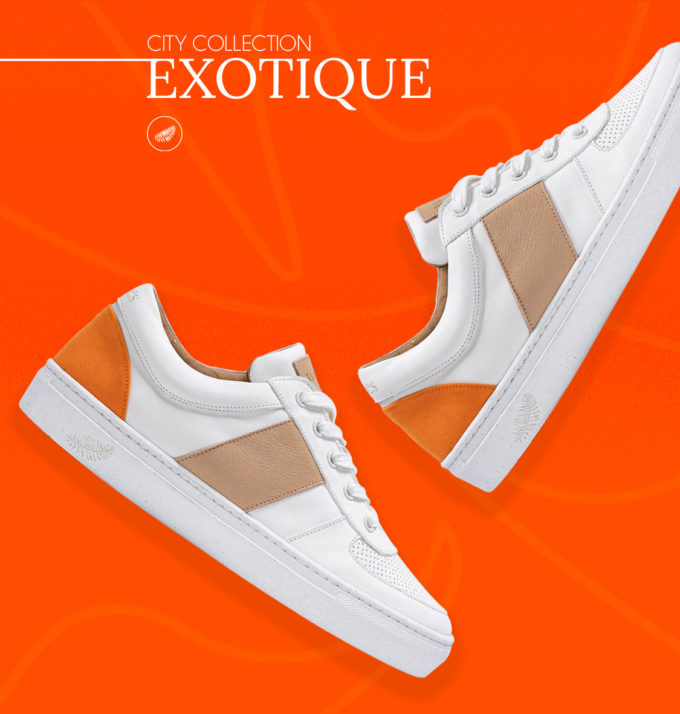Nicolas Raudrant : “We want to be a bridge between the two cultures.“
To challenge Nike, Puma or even Converse, in the world of sneakers, by bringing an ethical, eco-responsible side, this is what Nicolas Raudrant and Aurélie Gisclon set out to do by founding Wibes in 2017. This brand produces its shoes in Portugal, in order to promote the short circuit as much as possible, and then uses wax, a popular fabric in the Ivory Coast, among its materials, all with the concern of respecting the environment and combining “a European know-how” with an “African tradition.” Interview with Nicolas Raudrant, one of the co-founders.
Feat-Y : What motivated you to co-found Wibes?
Nicolas Raudrant : There are several things. The first is the meeting with my partner, Aurélie. It was the starting point for the creation of the brand. We met in the United States. We were still students. One thing leading to another, we realized that we had France and the Ivory Coast in common, because I was born in the Ivory Coast and grew up there, my family has been there for 40 years; and Aurélie’s father also works in the Ivory Coast. We have these two cultures in common. At the beginning, it was a class project. We wanted to create something related to fashion. In particular the sneakers. Everyone was wearing the same ones that day. The idea came to us, just like that, to create sneakers that are responsible. It’s super important for us to put it from the beginning of the brand. Doing things well, in a responsible way, with a social dimension, with the help of a humanitarian association or with an eco-responsible dimension. Doing things well, with materials that respect the environment. It is really this beginning of meeting that inspired the brand.
Feat-Y : Why did you start producing sneakers?
N.R : It’s something we’ve enjoyed for a long time. As kids, we always enjoyed sneakers. It’s what we wore all through our youth and growing up after. Sneakers have evolved since we were born. They’re still around, even more so today. It’s something that belongs to everyone and everyone can find their style with sneakers. Beyond a sports product, today it is a lifestyle product. You can wear it on any occasion. With a suit, a skirt. Everyone can wear it. So, we wanted to bring something new in 2017, when we founded the company. Sneakers are often dominated by big names in this world. We realized that there were not really any brands, at the time, that offered products that were eco-responsible, that did not include a social dimension at the heart of the brand. That came after, through a CSR approach. But it was more like joining a movement that was already underway than something that was theirs from the start. All these motivations showed that the sneakers are a project of the heart. Our third partner, Julian, a designer, who also joined us, is passionate about sneakers. He did a thesis on sneakers. It is the sneaker that is at the center of the brand and of the three of us as well.
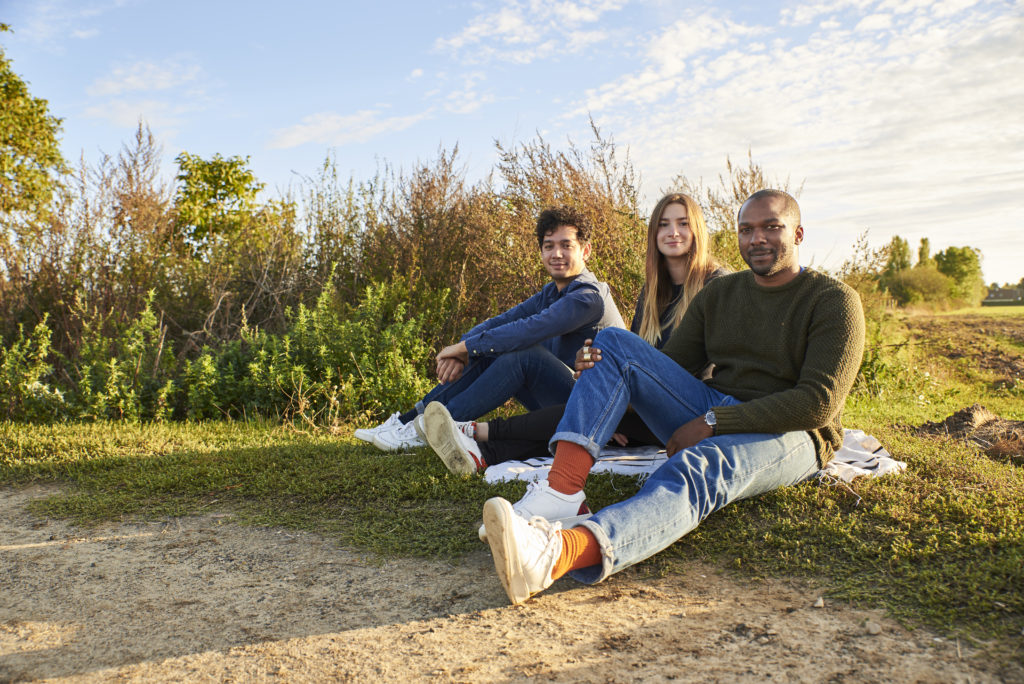
Feat-Y : How did you design your business model to be ethical?
N.R :Our business model is quite simple, in the sense that everything is concentrated in Europe. Ethics is a broad word that covers different themes. For us, it includes the social dimension. But also the eco-responsible dimension, which is the main point. We want a European production because, first of all, we want to work in short circuit. We are a French brand. We wanted a production that was as close as possible to France, knowing that in France, we did not find, at the beginning, a company that could produce the standards we wanted, nor the designs we had. We turned to Portugal, which is one of the best countries in the world for the production of sneakers. It’s a stone’s throw from France. They have a know-how for several generations on shoes. And mainly on sneakers. The first ethical aspect is a Portuguese production, so European.
Then, it is the supply of materials. All the raw materials for our shoes are European, except for the wax, which is African; Ivorian to be precise. Because we wanted a typically African fabric, which meets our expectations and which also belongs to our culture. And not a product that comes from elsewhere. Apart from this fabric, all the raw materials are either Portuguese, for more than 80% of the raw materials in fact, or Spanish for the fabrics, which are recycled, or Italian for the leathers. Everything is really ethical, in the sense that we try to improve, from production to production. The more the collections progress and the more the budget allows it, the more we will be ethical. Afterwards, we will tackle the transport, because we transport in a classic way, by truck. But we know that there are greener solutions. These are things that we will tackle later, when we can.
Feat-Y : You are committed to the education sector in Madagascar and Côte d’Ivoire, especially for girls. What does this commitment mean to you?
N.R : A lot of things. For us, education is something we’ve known since we were kids, because my parents work in education. My father was a teacher. Aurélie’s parents also work in education. We grew up in a school environment, an educational environment. We know the role that education can play in the accomplishment of a person. Having grown up in Madagascar, Ivory Coast, Senegal and France, we realize that in all these countries, not only developing countries, education plays a key role. It is a factor that allows a person to be fulfilled or not. We can see today the problems we have in France, with the school system, and we can see it even more easily when we go to the Ivory Coast. That’s why education is a sector that really spoke to us, because we know it. We chose a humanitarian association in Ivory Coast to start. Because it is there that everything started, in Abidjan, the economic capital of the Ivory Coast. We are attached to an association called AIFCI, for Association Internationale des Femmes en Côte d’Ivoire, because it is an association that we knew and my mother was a volunteer. It is still a story of meeting. The people who work there are volunteers. Nobody receives a salary for the work and the time invested by them. It speaks to us because these are people who believe in what they are doing, and are not there just to get a paycheck at the end of the month. Devotion to the cause is important and we have chosen an education especially for women because, all over the world, women, compared to men, are neglected. Either by the school system or by society in general. We thought, in our small way, to give these women a chance to do things that they couldn’t do without education. It’s just a beautiful thing and if we could make a contribution, we were really happy to do it.
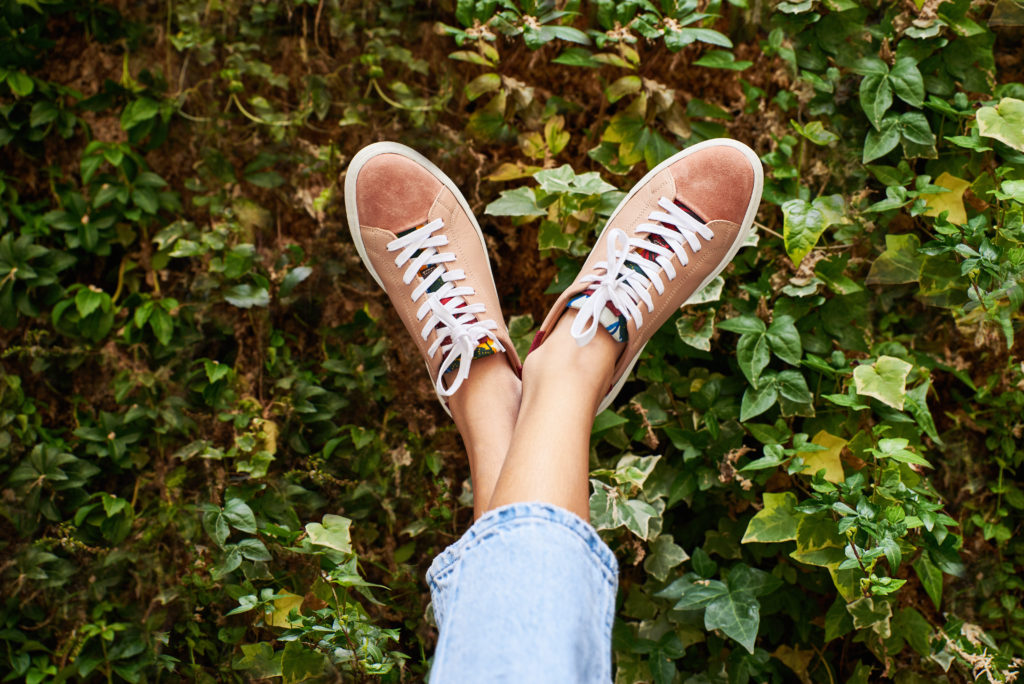
Feat-Y : You use wax, coming from Ivory Coast, as fabric for your shoes. Why this particular fabric?
N.R :There are many fabrics that could have been placed on our shoes, because we wanted a sneaker that straddles France and Africa. In particular, the Ivory Coast. A sneaker that looks like us, simply! We had the choice between several fabrics on the continent. But the wax speaks to us even more than the others because we know it since we were born. Julian is Ivorian too. We could wear it, our family too. It is a fabric that we really know and that belongs to us, in a certain sense. We think it’s a beautiful symbol because it was imported by the Dutch to Africa, then kept by Africa, which reinterpreted it in its own way. We thought it was a nice nod to something that can be seen as negative, but ultimately becomes positive. It’s something we really appreciate. It’s a nice evolution and it’s something we want for our brand, which transmits positive values to a wider audience for a fabric that is too often reduced to something simple, which is actually super complex and has many variations. It also costs a lot of money, even if there are brands that contribute to popularize it at very low prices, while behind, there is a real know-how, whether in the design of the fabric, in the confection, in the complexity of the patterns that are attributed to it too.
Feat-Y : All the production is done in Portugal. Why did you choose this country?
N.R : Portugal is a story of meeting. We had inquired about the production of shoes, because at the beginning, we knew nothing about it. We asked different questions. We already knew that Italy and Portugal were the two best countries for sneakers and shoes in general. We contacted different companies in Italy and Portugal. The first one that answered us was Portugal. It was a meeting with a person who allowed the project to start. It is our relay with the factory in Portugal which manufactures our shoes. That’s why we chose Portugal. We asked about the country. It is part of the European Union. It is a country close to France. In addition, they have a real traditional know-how. A real heritage that is passed on from generation to generation. We work with a family factory, where it is passed on from father to son. A passion for shoes. That’s why Portugal spoke to us, in addition to having been there and knowing the country.
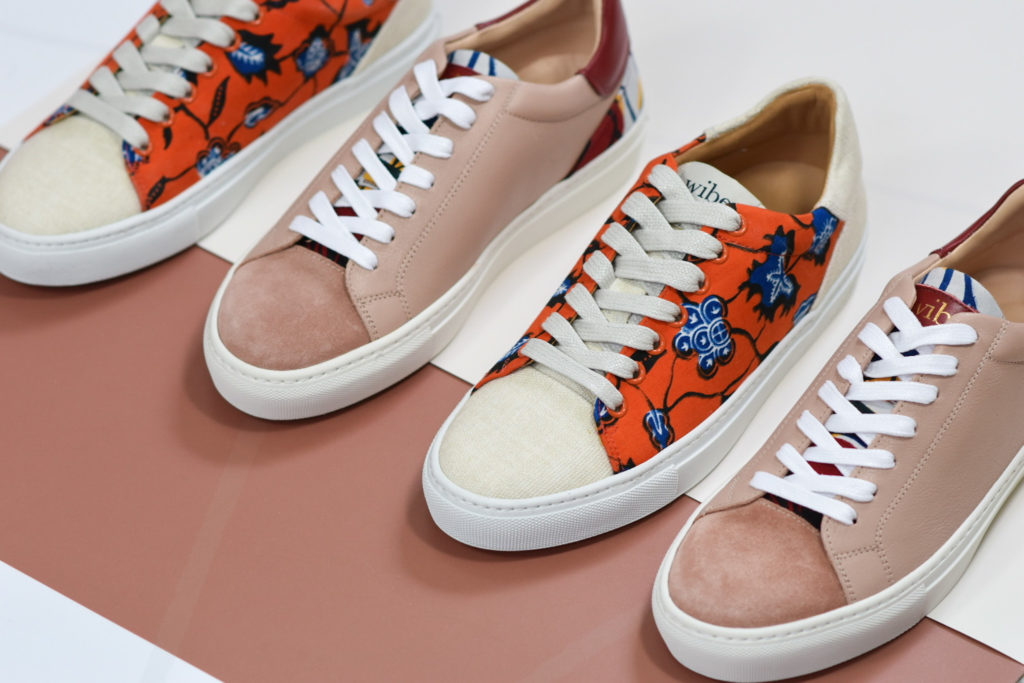
Feat-Y : What type of clientele are you initially targeting?
N.R : Our clientele is quite large. We did not want to target only one type of clientele, either just Europeans or just Africans. We want to be a bridge between the two cultures, and to value a European know-how as much as an African tradition. Our shoes and the values of the brand allow us to be quite broad in terms of customers. But we see that the 25-35 years old are the main target, at the beginning. A little more women than men. But elsewhere, it’s mostly people who are open-minded and who are looking for a product that they can’t necessarily find elsewhere. Something a little innovative, a little new, a little urban, that will speak to them and that can go with any outfit at any time.
Feat-Y : Do you think you will evolve towards a more popular dimension, in the medium/long term?
N.R : Wibes’ goal is to become a reference brand in terms of sneakers, always keeping our DNA and the values we hold dear. We will never be a popular brand, in the negative sense of the word, accessible to anyone, anyhow. The goal is to be popular, in the good sense of the word, i.e. to be a reference as an eco-responsible brand and a social brand. These are attributes that are really important to us, even if it’s not the only thing that defines the brand. The goal is for people to appreciate the design. Just like any other sneaker. But that behind it, our values support our speech and that people adhere to these values. Today, it’s still something a little new, even if the movement is underway. We would like the eco-responsibility and the social dimension, paying attention to people in the whole production process, to be normal and not to be mentioned anymore. That’s what we would like in the long run. We would also like to conquer the world and have Wibes everywhere.
Feat-Y : Aside from ethics and production process, how do you plan to further differentiate yourself from established competing brands (Nike, Puma, Converse, etc.)?
N.R : In the brand itself, the designs are already classic. For the moment, we are a brand that launches. We try to introduce novelty, originality, with the wax fabric. We come to bring a touch of color. We are lucky to have a designer who is super strong, bringing a special touch to the shoes and therefore, these are not shoes that we imagined by taking a classic sneaker, like Adidas or Nike. We try to bring something new every time we launch a new collection. We are also lucky to have a team that is hybrid, between two continents. The chance to be bicultural brings an extra touch in the conception, in the design of the shoes, from the start. Beyond the values, which we already talked about earlier, it is the search for new materials, the search for new designs. This is what will allow us to last over time and to differentiate ourselves from classic brands that have their own field of predilection, such as brands that are a little more sporty or technical, like Nike or Adidas. We are lucky to have a lot of opportunities, but also a lot of different resources that allow us to approach the future with serenity, saying to ourselves that there is room for everyone in the market and that every brand that thinks well, works well, can find its audience. Today, people are looking for novelty. We all buy from the big brands because they are pillars in our society. But we always try to look for the little different nugget that will make us stand out, either in style or just in the message we want to carry as a person.
Feat-Y : Have you developed partnerships, sponsorship, with personalities likely to attract to your models and share the values you defend?
N.R : Collaboration, partnership, is something we started to look at in 2019, which was our first real commercial year. We made a small collaboration with an ethical brand in South Africa, which makes bags in the townships, by people in need. It is also a brand that has the same values as us, even if it produces something else. It is complementary to the accessory. We made a very limited series, to test the collaboration. And today, it’s something we would like to develop later. For the moment, we are really focusing on our own collections. We will have opportunities, soon, to make collaborations with other brands or with other people. Partnerships with public figures, influencers, is something we’re looking at carefully. We are developing our communication strategy. Whether it’s digital or print. It’s something that comes right after. We’re working on it right now. We’re trying to find people who share our values and who could attract their community to discover a brand like ours that resonates with them.
Interview Jonathan Baudoin
Site web: https://wibes-store.com
Page Facebook: https://www.facebook.com/WibesShoes/
Page LinkedIn: https://www.linkedin.com/company/wibes/
Compte Twitter: https://twitter.com/wibesshoes
